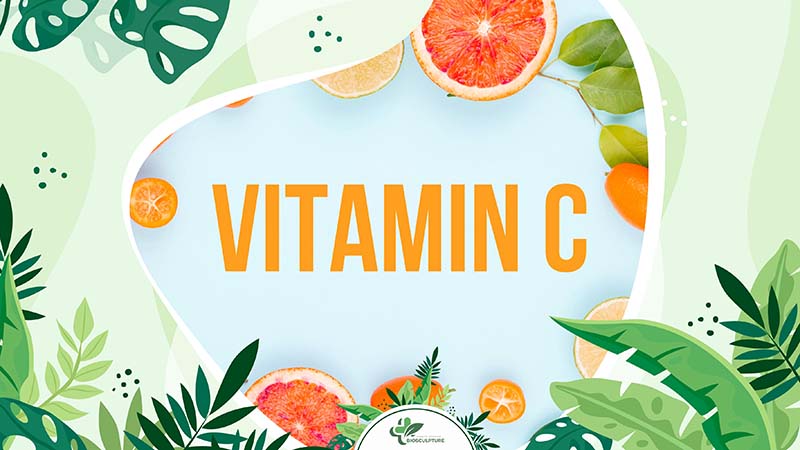When is the best time to take Vitamin C? Vitamin C is a powerful nutrient, providing countless benefits for your immune system, skin, and bones. This essential vitamin not only helps fight infection but also speeds up the healing process and has strong antioxidant properties. With countless benefits packed into one serving, we need to consume it correctly and at the right time. In this discussion, we aim to dispel any uncertainty and reveal the optimal time to consume Vitamin C.

1. The Role of Vitamin C in the Body
Vitamin C is very important for many parts of our body and really helps our immune system, mainly because it’s an antioxidant. Antioxidants are important for protecting our bodies from something called oxidative stress, which can hurt our organs and tissues over time. By supporting our immune system’s defenses, antioxidants like vitamin C are key to keeping us healthy.

People often praise vitamin C for helping our bodies fight off sickness, like colds, and some even use it trying to fight off COVID-19 during winter. However, there’s still research being done to see how effective it really is against these infections.
When it comes to long-term health problems like cancer and heart diseases, we’re still not sure how much vitamin C can help, as there isn’t enough scientific proof yet.
But, we do know for sure that vitamin C can stop scurvy, which makes you weak, slow to heal wounds, and easy to bruise, all because of not having enough vitamin C in what you eat.
Apart from its role as an antioxidant, vitamin C is also really important for making and handling several important things in our body. It helps make collagen, which is a protein that’s needed for your skin, bones, and healing wounds; L-carnitine, a substance that helps change fat into energy; and neurotransmitters, which are chemicals that help send messages through our nervous system. Plus, vitamin C helps our body use iron from plants better.
2. Health Benefits Of Taking Vitamin C
Vitamin C might offer several health advantages, such as reducing symptoms like:
- Stress: Studies suggest that vitamin C is beneficial for individuals with weakened immune systems due to stress, a common issue nowadays. This is particularly important as vitamin C is one of the nutrients most sensitive to stress and is often found at low levels in individuals who drink alcohol excessively, smoke, or are obese.

- Colds: While vitamin C isn’t a complete cure for the common cold, research indicates it could prevent more severe complications. Studies have shown that taking vitamin C might lower the risk of developing further issues like pneumonia and lung infections when you have a cold or the flu.
- Stroke: There are mixed research findings, but one study from the American Journal of Clinical Nutrition highlighted that individuals with higher levels of vitamin C in their blood had a 42 percent reduced risk of stroke compared to those with lower levels.
- Skin Aging: Vitamin C is important for the health of both the inside and outside of the body. A study in the American Journal of Clinical Nutrition looked at 4,025 women aged 40 to 74 and found that higher intake of vitamin C was linked to a reduced chance of wrinkles, dry skin, and other signs of skin aging.

Additionally, other research has highlighted vitamin C’s potential in improving macular degeneration, lowering inflammation, and reducing the risk of cancer and cardiovascular diseases.
3. Optimal Timing and Methods for Taking Vitamin C
The ideal time to take vitamin C is when your stomach is empty, which typically means in the morning, 30 minutes before eating or two hours after a meal. Since vitamin C is water-soluble, it’s absorbed well by the body. The body uses the amount of vitamin it needs, and the surplus is flushed out in urine.
Vitamin C is available in several forms including ascorbic acid and mineral ascorbates like sodium ascorbate, calcium ascorbate, and others combined with bioflavonoids. For supplementing with vitamin C, ascorbic acid is generally the preferred option because it’s highly bioavailable, meaning the body can absorb and use it effectively.
4. Recommended Vitamin C Dosage from Food Sources
The amount of vitamin C your body needs each day varies based on your age and dietary intake. The body is quite adept at regulating vitamin C levels, typically storing it in cells in higher concentrations than in the blood plasma.
The National Institutes of Health (NIH) state that if you consume a moderate amount of vitamin C, your body will absorb about 70–90% of it. A moderate intake is considered to be between 30–180 milligrams (mg) per day. This absorption rate underscores the importance of consuming an appropriate amount of vitamin C daily according to your age, as excess intake beyond what your body can absorb might not be beneficial.
Here are the NIH’s daily vitamin C intake recommendations:
- Babies and infants: 40–50 mg
- Children ages 1–8: 15–25 mg
- Children ages 9–13: 45 mg
- Teens ages 14–18: 65–75 mg
- Adults: 75–90 mg
Typically, males may require the higher end of these recommendations, and the needs for pregnant or breastfeeding individuals are increased.
Incorporating a variety of fruits and vegetables into your diet, such as oranges, strawberries, kiwi, bell peppers, and broccoli, can help you meet these vitamin C intake recommendations naturally without the need for supplements.

5. Important Considerations When Taking Vitamin C
Not getting enough vitamin C can lead to deficiency symptoms such as tiredness, swollen gums, easy bruising, gum bleeding, feelings of depression, loss of teeth, and anemia. The most extreme deficiency is scurvy, which can be deadly if not treated.
Your body typically eliminates excess vitamin C through urine, but taking too much can still be harmful. Signs that you might be consuming too much vitamin C include stomach cramps, diarrhea, and nausea.
The National Institutes of Health (NIH) recommends that adults should not consume more than 2,000 mg of vitamin C per day, counting both food sources and supplements. This helps prevent adverse effects while ensuring you get the benefits of vitamin C.
6. Food Sources Rich in Vitamin C
Fruits and vegetables are the best sources of vitamin C, but vitamin C can be easily destroyed by factors such as heat and light. To minimize the loss of vitamin C in vegetables and fruits, it’s beneficial to store and prepare them in ways that preserve their nutrients.
Some top sources of vitamin C include citrus fruits, green peppers, strawberries, tomatoes, broccoli, white and sweet potatoes, dark green leafy vegetables, cantaloupe, papaya, mango, cauliflower, cabbage, raspberries, and blueberries.
To preserve the vitamin C content, consume these foods raw whenever possible, as cooking can reduce their nutrient levels. If you do cook them, use methods like steaming or microwaving rather than boiling to minimize nutrient loss. Additionally, keep fruits and vegetables in a cool, dark place and eat them soon after purchasing to ensure you’re getting the most vitamin C from your food.
7. Frequently Asked Questions
Is it beneficial to take 1000mg of vitamin C daily?
Taking 1000mg of Vitamin C daily can be more than what most adults need, exceeding the Recommended Dietary Allowance (RDA). While it could benefit those lacking vitamin C in their diet, such a high dosage might lead to side effects for some people, such as digestive disturbances.
Is daily intake of vitamin C good for health?
Yes, consuming Vitamin C daily is crucial for maintaining overall health. It supports the immune system, aids in the formation of collagen, and improves iron absorption.
How long should one continue taking vitamin C?
Since the body doesn’t produce or store Vitamin C, it’s important to ensure continuous intake, either through diet or supplements. If you’re using supplements, stick to recommended dosages and consider consulting a healthcare provider, especially for long-term use, to address any specific health needs or concerns.
In conclusion, understanding “When is the best time to take Vitamin C” can significantly impact your health, enhancing immune function and overall vitality. We hope this guide has illuminated the optimal timing to maximize the benefits of this crucial nutrient. We’d love to hear about your experiences and any changes you’ve noticed since adjusting your Vitamin C routine. Please share your stories and feedback in the comments below.
For more insightful health tips and guides, don’t forget to explore our other blogs at Biosculpture. Together, let’s sculpt a healthier, happier you.


